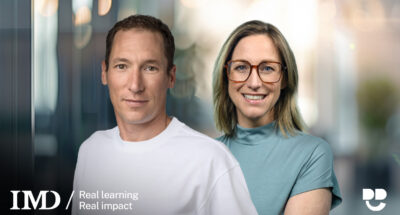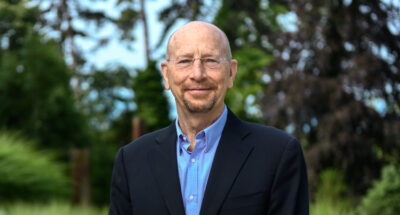
“We were so scared of our IPO”: Leaders Unplugged with former On-CEO Marc Maurer
Marc Maurer shares how ON grew from startup to IPO by defying hype, focusing on purpose, and leading with humility in this candid Leaders Unplugged episode....

by Jennifer Jordan Published February 13, 2024 in Leadership • 9 min read
What leads to success when facing tough times? Jennifer Jordan, Professor of Leadership and Organizational Behavior at IMD, interviews Anthony Giovinazzo, an experienced international pharmaceutical executive best known for his leadership of Cynapsus Therapeutics Inc., a Canada-based company that developed a treatment for Parkinson’s Disease patients known (to insiders) as APL-130277.
A sublingual strip delivering a drug called apomorphine, APL-130277 was created to better manage “off” episodes of Parkinson’s, which can be debilitating for millions of patients. Because it’s administered orally, like a breath-freshening strip, it can quickly and effectively replace cumbersome (and sometimes painful) injections. APL-130277 had been patented by Cynapsus and was in Phase 3 trials for the US market when it was sold to Sunovion Pharmaceuticals Inc. (a division of Sumitomo Dainippon Pharma Co. Ltd. Of Tokyo) in a deal then valued at $841m. The acquisition was successfully completed in October 2016.
In a recent leadership class with MBA candidates at IMD, Jordan asked Giovinazzo six questions about his leadership traits and challenges. Here’s an edited version of the interview, with some hard-won advice for fellow leaders.

AG: At Cynapsus, from the very beginning, there were naysayers who did not believe that a thin film strip of apomorphine for Parkinson’s “off” episodes was going to succeed. The naysayers (including key opinion leaders or KOLs as well as investors and bank analysts) also said that our patents were not going to be granted (they were), that the chemical solution was not going to work (it did), that there was an infinitesimally small market that was not going to expand (to greater than a billion per annum), and so on.
My mantra and my passion, which I shared with my core team, was that our IP [intellectual property] would prevail and that our solution would be meaningful for Parkinson’s patients and their caregivers, so our market would expand.
And yet, along the way, we encountered events and confronted realities that required change to go forward. I’ll give you two specific examples. First, in our preliminary models for testing on rabbits, we had a formulation that showed over 90% absorption, which was very good. When we started trials on human beings, we had a different outcome. So, we had to go back to find a better balance and change some ingredients.
A second setback required us to dig in even deeper. In the US, a new product may win FDA [Food and Drug Administration] approval if it’s therapeutically equivalent to a reference product (one that has already been granted FDA approval) despite being materially different. This approval pathway – also known as Section 505(b)(2) – required that our product delivered the same C-Max [peak] and AUC [area under the curve] as the reference product (in our case, subcutaneous injections of apomorphine). In our first human trial, we did not achieve that. Honestly, we thought we were sunk. But on closer examination of the clinical data, we realized we had some added benefits. Our CMO [chief medical officer] knew FDA law very well and he homed in on a little-known interpretation of equivalence – clinical equivalence – that was acceptable to the FDA. That specialist knowledge saved the project.
Perseverance definitely paid off for us, but it wasn’t easy. Getting it right involved intuition and instincts, as well as careful analyses of possible scenarios over time. When someone quotes “The Gambler” by Kenny Rogers and says you have to “know when to fold them,” I believe that goes against the notion of having a long-term goal.
AG: That’s a great question. For my management team, I want to hire people with extensive experience, including successes and failures – because failures teach us where not to go and what not to do. I ask: Do their experiences demonstrate their functional expertise and management acumen? Do the people they worked with identify them as real experts (and not just shooting from the hip)? Have they resolved difficult problems? Do they have good analytical skills for testing out various scenarios? Can they accept others’ challenges to get to a better decision or solution? In a high-growth setting, can they focus on delivery and persevere to get there?
I also ask: How much risk do they take on? Too many risk-takers on one team (given that I am one myself) is not good. In the end, I ask myself how a person might add to the group’s success. That’s determined by their experience, intelligence, and perseverance as well as their reactive and proactive capabilities.
To give you an example. I was looking to hire an expert in thin-film manufacturing, someone scientifically adept enough to solve problems on the go and work well in a small team. I also wanted this person to have a sense of humor and be self-assured, driven, and passionate about what we were doing. By asking around, I found someone: a global leader in thin-film manufacturing living in Switzerland with 50 product launches already under his belt. It took me a year to convince him to join us.
AG: From reading a lot and hearing others do it well — or not so well. My days working as an investment banker brought home the need to deliver a message succinctly and effectively. In life sciences, you must be able to tell a brief but coherent story about your company in investor presentations, large and small. Who are you? Why is what you have important? Why is it better than the others out there? How will you succeed? I have heard many of my peers go too deep into the science. To tell a good story in business, I think you need a big-picture view of the strategy and a willingness to mine personal experiences that are real and relatable.
AG: My most challenging ethical dilemma centered on the projected pricing of our product. At the start of Phase 3 studies [for FDA approval] in 2015, Cynapsus had to invest in some very expensive consultants to help us get data on patients, caregivers, and neurologists (specifically specialists in movement disorders) regarding how they’d either use, manage, or prescribe the drug candidate. These consultants also studied our commercial plan and consumers’ willingness to pay.

“Getting it right involved intuition and instincts, as well as careful analyses of possible scenarios over time.”- Anthony Giovinazzo, Founder of Cynapsus Therapeutics
These consultants all came back with the same advice: basically to “charge a very high price to better profit in an environment of initial low use.” I disagreed. I still firmly believe what I’d learned as an MBA at IMD some 35 years earlier: profit is more positively impacted by growing volume and market share in the long term than it is by price gouging in the short term. I insisted that a lower price would be the smarter path to follow.
My resolve was tested when we were later in advanced negotiations to be acquired in 2016. A senior member of the acquirer’s executive management team wondered if pricing high could drive early profitability. I explained that I thought that most patients were not wealthy enough and that a low price per dose would drive volume to take care of profitability in due course. To my relief, they followed my suggestion, because this was at a moment when more predatory pricing was en vogue. But we saw companies run into trouble with these ethical challenges; they raised drug prices astronomically, which caused a backlash from regulators, industry commentators, and public opinion. (Those companies suffered a lot of reputational damage, and most have since changed their corporate names and their pricing strategies.)
AG: To me, showing some vulnerability means being a human being and not pushing an “I am a genius” or “I have all the answers” agenda. Not having all the answers means being open to others’ input, questions, and solutions. It inspires creativity and trust among the team. It fosters the idea that we all make mistakes – but hopefully, we don’t repeat them.
Confidence is important in leadership. To be confident without being arrogant, you have to be able to survey the surroundings, hear what people are telling you, and assess the realities, drawing from what you know.
AG: Being much more mindful of my health, I make time for eating better, taking my meds and supplements, exercising, and generally keeping stress under control. I no longer worry that I might fail in every way. For a while, it was really scary for me. I can now admit that I borrowed money against my house without my wife’s knowledge to keep Cynapsus afloat. I can’t even imagine what would have happened if we had given up and failed.
But that was then. Now, I have stepped away from Cynapsus but I am active on the boards of a few companies where I serve more as a coach, steward, and mentor. I also spend time trying to give back to younger people, including my high school alma mater where I sponsor scholarships. I also enjoy speaking at IMD and other educational institutions. I hope some of tomorrow’s leaders can learn from my story and experiences.
The interview was conducted in November 2023.

Social psychologist and Professor of Leadership and Organizational Behaviour at IMD
Jennifer Jordan is a social psychologist and Professor of Leadership and Organizational Behavior at IMD. Jennifer’s teaching, research, and consulting focus on the areas of digital leadership, ethics, influence, and power. She has received specialized training and certifications in lie and truthfulness detection, as well as in conflict resolution within organizations. She is Program Director of the Women on Boards and the Leadership Essentials program, and co-Director of the Leading Digital Execution program.

Founder of Cynapsus Therapeutics, IMD MBA (1986)
Anthony Giovinazzo is an internationally recognized expert in intellectual property, drug development, and commercialization including numerous licensing agreements. He has more than four decades of experience in the field, and 25 years specializing in diseases of the central nervous system. He has authored or co-authored several peer-reviewed papers on strategic and financing issues in the biopharmaceutical industry.

July 8, 2025 • by Alyson Meister, Marc Maurer in Leadership
Marc Maurer shares how ON grew from startup to IPO by defying hype, focusing on purpose, and leading with humility in this candid Leaders Unplugged episode....

July 7, 2025 • by Richard Baldwin in Leadership
The mid-year economic outlook: How to read the first two quarters of Trump...

July 4, 2025 • by Arturo Pasquel in Leadership
Susanne Hundsbæk-Pedersen, Global Head of Pharma Technical Operations at Roche, shares how she has navigated the various pivots in her career, and the importance of curiosity, optimism and energy. ...

July 3, 2025 • by Eric Quintane in Leadership
Entrepreneurial talent who work with other teams often run into trouble with their managers. Here are ways to get the most out of your ‘boundary spanners’...
 Audio available
Audio availableExplore first person business intelligence from top minds curated for a global executive audience